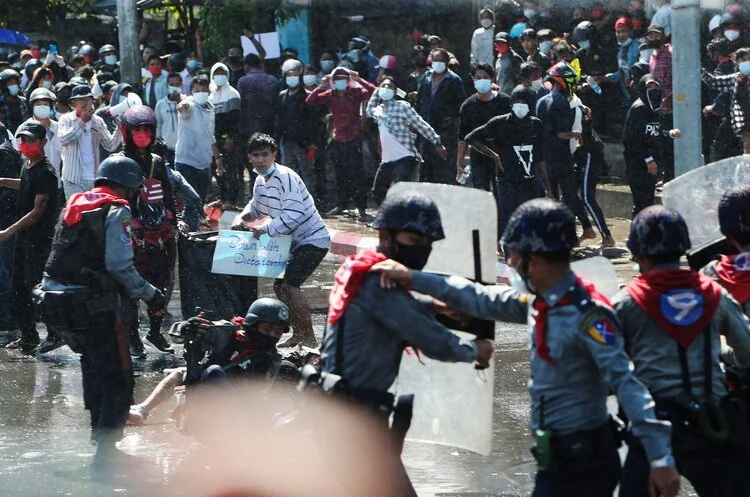Myanmar Coup
Abductions, Detentions And Regular Internet Shutdowns - Threats To Journalists Amid Military Coup In Myanmar
Photo Credit: Associated Press
On the early morning of February 1, 2021, the military seized control over Myanmar and declared a state of emergency. While the military coup took the world by surprise, several journalists and human rights activists admitted in conversations with CFWIJ that they had seen it coming. The military’s takeover of power followed a general election in which the National League for Democracy (NLD), led by Aung San Suu Kyi, claimed an overwhelming victory. In the immediate aftermath of the coup, the military started to arrest political and civilian leaders, shut down the internet, and cut off flights. Together with several opposition leaders, Ms. Suu Kyi remains under house arrest and is now facing two criminal charges. The toppling of the democratic government sparked a massive civil resistance. Hundreds of thousands of people across the country began demonstrations, showing their defiance and demanding the release of all democratically-elected political leaders. While the protests were relatively peaceful at the beginning, they soon escalated, becoming violent and dangerous. The clashes between the people and the police are reaching an unsettling level of brutality as officers deploy water cannons, rubber bullets, and tear gas to disperse crowds. The violence against the protestors intensifies simultaneously with the relentless crackdown on press freedom.
The Coalition For Women In Journalism (CFWIJ) is regularly in touch with journalists in Myanmar who have expressed severe concerns for their safety. Many of them remain in hiding and need to change their location regularly. They can only move themselves and their equipment at night. They have reported to us a tangible fear of being arrested, abducted, and dragged out of their houses during the police’s nightly raids. They operate amid regular internet shutdowns and are afraid to speak up about the threats due to potential reprisals. Growing censorship makes getting reliable information outside of Myanmar incredibly challenging. A new law proposed by the Junta will oblige internet providers to reveal user details to the authorities if requested. If introduced, it can result in widespread censorship and infiltration of the citizens. According to the new cyber law, anyone spreading misinformation or disinformation could face a punishment of up to three years in prison.
One of the journalists we spoke to described how unsafe she feels as the situation is steadily deteriorating. “All of the journalists are in potential danger, regardless of what they do. It can certainly be fieldwork but also just edits of the coverage, managing websites, and coordination of logistics directly from home. Those who work on the ground are usually not very well equipped— they don’t have helmets or any safety kit, therefore they may experience physical violence. Women journalists are additionally exposed to threats strictly related to their gender, such as sexual harassment. The danger of sexual assault is real for any woman who decides to appear at a protest” she told CFWIJ. Another female journalist, who also prefers to stay anonymous, painted a harrowing picture of how the police and the military persecute township residents. “Those who are allegedly against the military rule, including politicians, businessmen, intellectuals, prominent public figures, are being taken away from their homes at night”, she said.
In this section, you will find our interviews with Myanmar journalists, our analysis of the unfolding events, and the latest updates from the ground. The Coalition For Women In Journalism (CFWIJ) carefully monitors the unsettling developments in Myanmar. We remain in close contact with reporters on the ground to help amplify their stories and try to provide the assistance they need. We stand in solidarity with the courageous journalists, human rights activists, and people in Myanmar who are determined and persistent in their fight for civil liberties. We commend your effort, and we will continue to support you. The military coup that overthrew the newly-elected parliament is halting the country’s democratic transition. CFWIJ reiterates its call upon the international community to take united action and pursue advocacy. As one of the female journalists put it: “Economic and political pressure can really make a difference. It just needs to be persistent”.
Statements
Voices Of Women Journalists
#Myanmar: Learn how journalists are dealing with the events unfolding in Myanmar with us.
Amidst the current confrontations between the military and protestors, journalists and activists are in especially under severe threats. Despite of this severity getting information out of Myanmar is difficult as most journalists and activists find themselves in hiding. We have spoken to multiple journalists who fear being targeted in multiple ways and are unable to report on it. One of the worse part of these events is theta most journalists (not all) who bring your the news from the ground are gagged by the media blackout and fear of repercussions. HERE’S HOW THE EVENTS UNFOLDED: On Monday, February 1 2021, the Myanmar military detained Aung San Suu Kyi and other government officials and seized control of the country. There have since been multiple protests demanding a reversal of this action. Police started to use water cannons, tear gas and rubber bullets against protesters, who refuse to retreat. CFWIJ is constantly in touch with many journalists on the ground. We are receiving unsettling updates from reporters who are deeply worried about their safety. Many journalists we spoke to have reported to us about condition from hideouts, where they fear military abductions, detentions and possible torture, we are told. As part of our effort to bring you awareness about conditions of journalists, we are featuring one of them here.
This plug in is a part of interview CFWIJs @katia_mierzejewska did with one of the female journalists from Myanmar. Due to safety concerns, we masked her voice as she prefers to stay anonymous.
Stay on top of Myanmar latest developments on the ground with CFWIJ
After weeks of defiant mass protests opposing the military coup, security forces are increasingly violent, using live ammunition to break up rallies.
CFWIJ is in regular contact with reporters in Myanmar who paint a horrifying picture of the constant persecution and suffocating environment for the media. Many journalists we spoke to have reported on the conditions from hideouts, detailing the detentions and physical violence that leave them tormented and traumatized. Journalists try to stay out of sight and don’t use their press credentials in any circumstances as it would make them a clear target.
This plug-in is part of CFWIJ’s @katia_mierzejewska’s interview with Naw Betty Han, a journalist at Frontier Myanmar. They discuss the recent reprehensible developments in Myanmar. Betty described in detail the cruel physical attacks she and her colleagues endure in clashes with the police. She explained what it feels like to sit on a ticking bomb, knowing that you may be arrested at any time.
📢 What is Happenning in Myanmar
CFWIJ is in constant contact with journalists and activists in Myanmar who paint a harrowing picture of the blatant human rights violations and the growing atmosphere of fear and surveillance. We offer a platform to reporters who bravely continue their work, despite the risk of dire consequences. This time, we spoke to an iconic Myanmar activist, Ei Thinzar Maung, about the pervasive violence of military rule.
In the unfolding Spring Revolution against the military coup of February 1, Ms. Ei Thinzar Maung has emerged as a fierce political activist, a symbol of public resistance. Her fiery oratory and intelligent analyses won over the public’s heart and made her a leader for the people to follow. Such dedication comes at a great price. Ei Thinzar Maung remains in hiding, fearing for her life.
The situation in Myanmar is continuously deteriorating. While the international community was appalled by the images of water tanks and rubber bullets deployed against protesters, we are now witnessing executions in broad daylight. Ei Thinzar Maung spoke to CFWIJ’s @katia_mierzejewska about the witch hunt on journalists. Local Myanmar journalists face severe risks of being detained, arrested, locked up, tortured, and executed. The military leadership frames them as “biased” against the state. Journalists are often accused of focusing on the military’s crimes, political repression, and exposing state secrets. They are regularly singled out for persecution.





